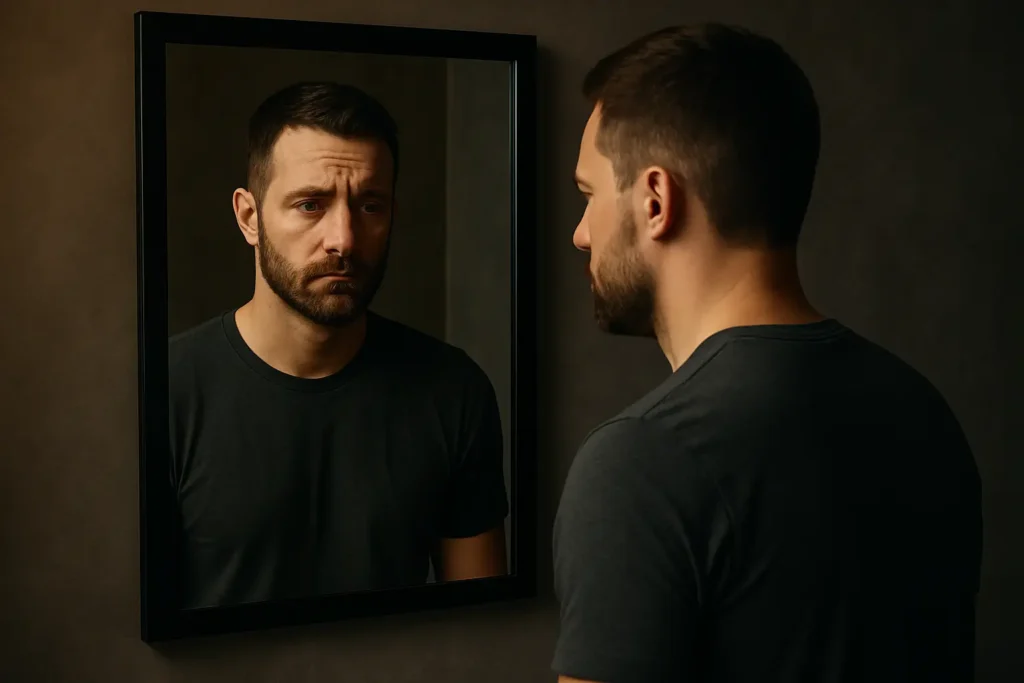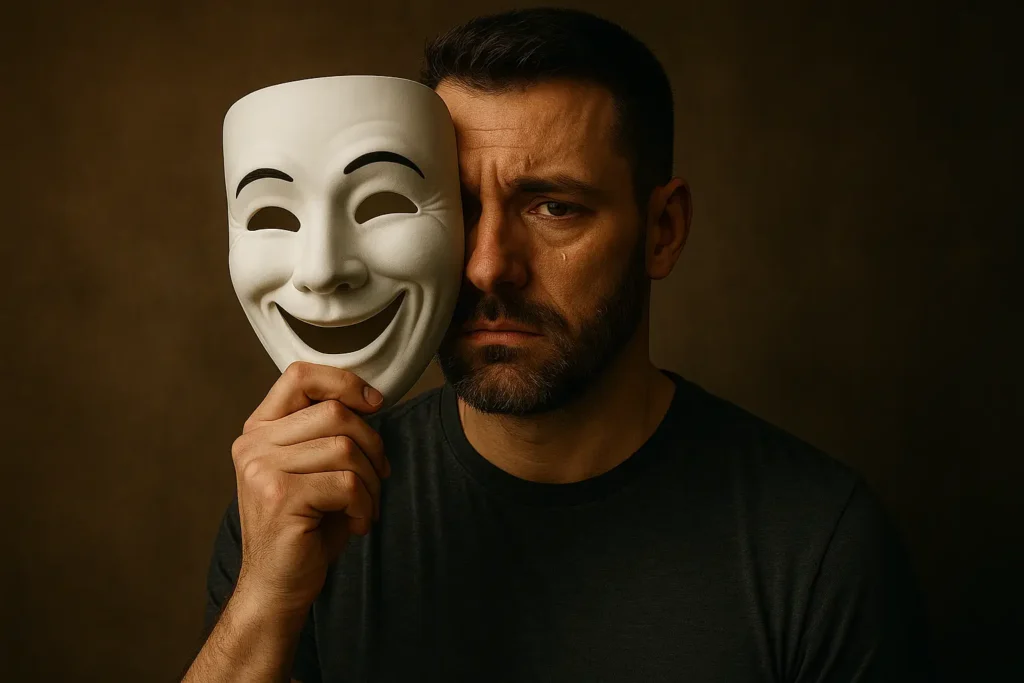
Table of Contents
Introduction: The Lie of “I’m Fine”
Ask most men how they’re doing, and you’ll hear the same script: “I’m fine.”
But here’s the reality: most men aren’t fine. They’re falling apart inside. And that’s the problem — this article will unpack why men pretend they’re fine, even when they’re drowning in silence.
But look closer. Behind closed doors, they’re drowning in debt, collapsing under breakups, numbing themselves with porn, booze, or endless scrolling. They’re not fine. They’re falling apart.
So why the lie? Because men are trained from boyhood to wear the mask. To never show weakness. To never admit they’re struggling. To pretend they’ve got it handled, even when the roof is caving in.
It’s not strength. It’s survival. A survival tactic that leaves men isolated, unseen, and bleeding silently.
This article isn’t about pity. It’s about exposing why men hide their pain — and how it’s killing them. Because pretending to be fine doesn’t make you strong. It makes you a prisoner in your own silence.
Related reading: Why Masculinity Still Matters
The Mask: Why Men Pretend They’re Fine

“I’m fine.”
It’s the most common lie men tell. Two words that shut down every chance of connection, every opportunity to be real.
Men learn this script early. Boys are told not to cry. To “man up.” To take hits without flinching. By the time they’re adults, the mask is second nature.
The mask says: “I’ve got it handled.”
The reality is: most men don’t.
Conditioned to Hide
Society rewards men who suppress. The stoic worker. The silent provider. The unshakable rock. And while resilience is valuable, suppression isn’t the same as strength. One builds discipline. The other builds pressure until it cracks.
Weakness Redefined
Here’s the twisted part: men are told showing pain is weakness, but breaking in silence is somehow strong. That’s why men go years hiding depression, financial struggle, or heartbreak until it finally explodes — usually in destructive ways.
The mask is protection. But it’s also poison. Because while it shields men from judgment, it also suffocates them from the inside out.
The Hidden Cost of Pretending You’re Fine

Silence always has a price. When men pretend they’re fine, they don’t escape the pain — they just bury it. And what’s buried doesn’t disappear. It festers.
Isolation
The first cost is isolation. Men who say “I’m fine” cut themselves off from support. They build walls no one can climb, then wonder why they feel alone. Isolation isn’t safety — it’s a slow form of self-destruction.
Depression and Anxiety
Silence is gasoline for depression. The more a man hides, the heavier it gets. Anxiety grows because every problem feels bigger in the dark. And with no outlet, the weight eventually crushes him.
Broken Families
When a man hides his struggles, his relationships suffer. Women sense the distance. Kids feel the tension. Friends drift away. Pretending to be fine doesn’t protect the people around him — it creates fractures that eventually break the entire structure.
Addiction and Numbing
Many men turn to numbing agents — alcohol, porn, drugs, endless entertainment. Not because they’re weak, but because silence demands an outlet. If you can’t speak it, you’ll sedate it. And numbing works… until it destroys the man using it.
The cost of silence isn’t just emotional. It’s physical, relational, and generational. The man who keeps saying “I’m fine” eventually pays with his health, his family, and his future.
Why Men Keep Pretending They’re Fine (And Can’t Drop the Act)
If silence is so destructive, why don’t men just speak up? Because dropping the act feels more dangerous than keeping it.
Fear of Judgment
Men fear that if they admit struggle, they’ll lose respect. Women will see them as weak. Other men will mock them. Society will dismiss them. So they swallow the pain, thinking silence is safer than rejection.
No Brotherhood
Most men don’t have a circle of brothers they can trust. Without that, there’s no safe outlet. They’d rather carry the weight alone than risk vulnerability in front of strangers or unsympathetic ears.
Mistaking Suppression for Strength
Here’s the biggest trap: men confuse emotional suppression with emotional mastery. They think bottling it up makes them strong, when in reality, it makes them fragile. A man who can’t face his emotions isn’t in control — he’s controlled by what he’s hiding.
So the mask stays on. Because men are taught it’s better to be quietly broken than openly human.
But that belief is a lie. And it’s the very lie that’s destroying men from the inside out.
The Masculine Way to Face Struggle
Strength isn’t pretending you’re fine. Strength is owning the truth without letting it own you.
Redefine Strength
Real strength isn’t silence. It’s honesty. Not the kind that wallows in self-pity, but the kind that says: “I’m struggling, but I’m still standing.” That admission doesn’t weaken you — it frees you.
Speak the Truth Without Self-Pity
Men don’t need to overshare or collapse emotionally in front of everyone. They need to speak truthfully when it matters. To a brother they trust. To a partner who respects them. To themselves in the mirror. Facing pain head-on is masculine. Hiding from it is cowardice.
Build Brotherhood, Not Isolation
Every man needs a tribe. A circle where masks can drop and truth can breathe. Brotherhood doesn’t make you weak — it sharpens you. Iron sharpens iron, but only if the blades actually meet.
Use Pain as Fuel
Pain isn’t the enemy. Avoidance is. The masculine way is to turn pain into power — to let it drive discipline, to let it carve resilience, to let it shape purpose. Pain can destroy you, or it can forge you. The difference is whether you face it or bury it.
Bottom line: you don’t become more of a man by pretending you’re fine. You become more of a man by facing life’s hits with honesty and courage.
Conclusion: The Truth Bomb
Men have been sold a lie: that pretending they’re fine makes them strong. That silence is noble. That hiding emotions earns respect.
But here’s the truth: why men pretend they’re fine is simple — they’re afraid of being judged, abandoned, or dismissed. But that silence kills them slowly.
Respect doesn’t come from hiding. It comes from facing the truth, scars and all.
The strongest men aren’t the ones who pretend they’re fine. They’re the ones who admit the struggle, face it, and move forward anyway.
So the next time you feel the urge to say, “I’m fine,” when you’re not? Stop. Say the truth instead. Not to everyone — but to someone who matters.
Because men don’t earn respect by pretending. They earn it by being real. And nothing is more masculine than that.
👉Want to reclaim your life?
Join My Newsletter The Honest Masculine weekly newsletter — and you’ll get instant access to my (The Masculine Comeback: A 7-Day Reset for Men Who Feel Lost). No fluff, no filters. Just raw truths about breakups, masculinity, fatherhood, and the quiet battles men face alone.
It’s for the man who’s done pretending.
👉 Want to accelerate this shift?
Grab my free guide: The Masculine Reset: 7 Uncomfortable Truths That Will Set You Free. Download it here




[…] the last few decades, that blueprint has been torn apart. The industrial age shifted work from physical labor to office desks. The sexual revolution rewrote relationship dynamics. Feminism […]
[…] men live like they’re fine when they’re falling apart. They’ve been taught that showing cracks makes them weak, so they hide everything until the […]